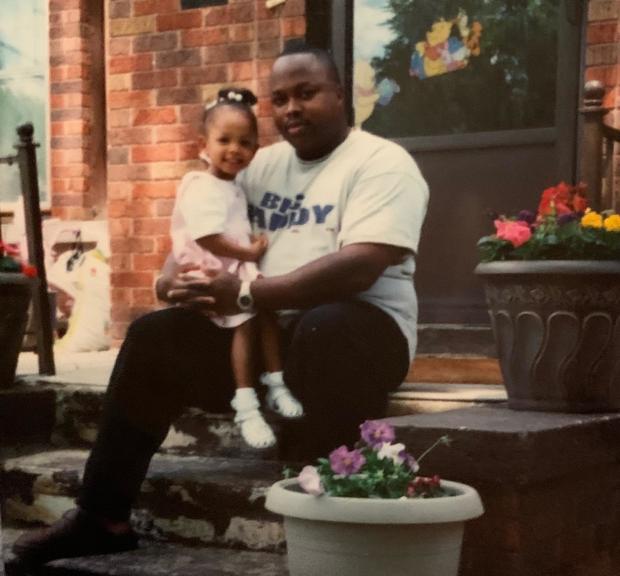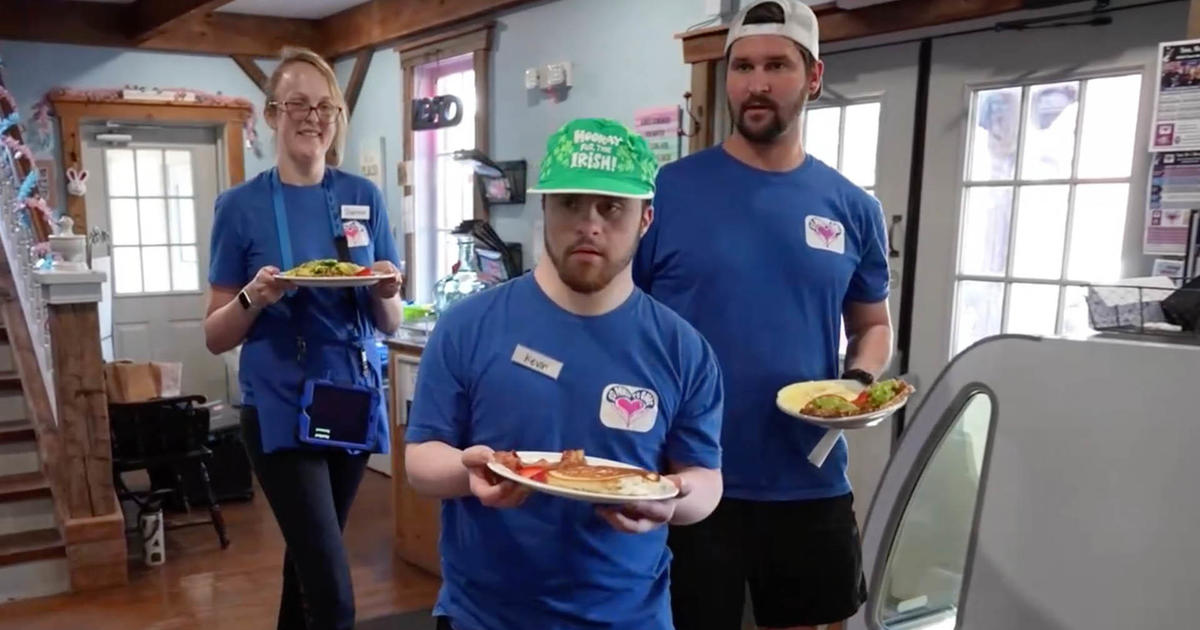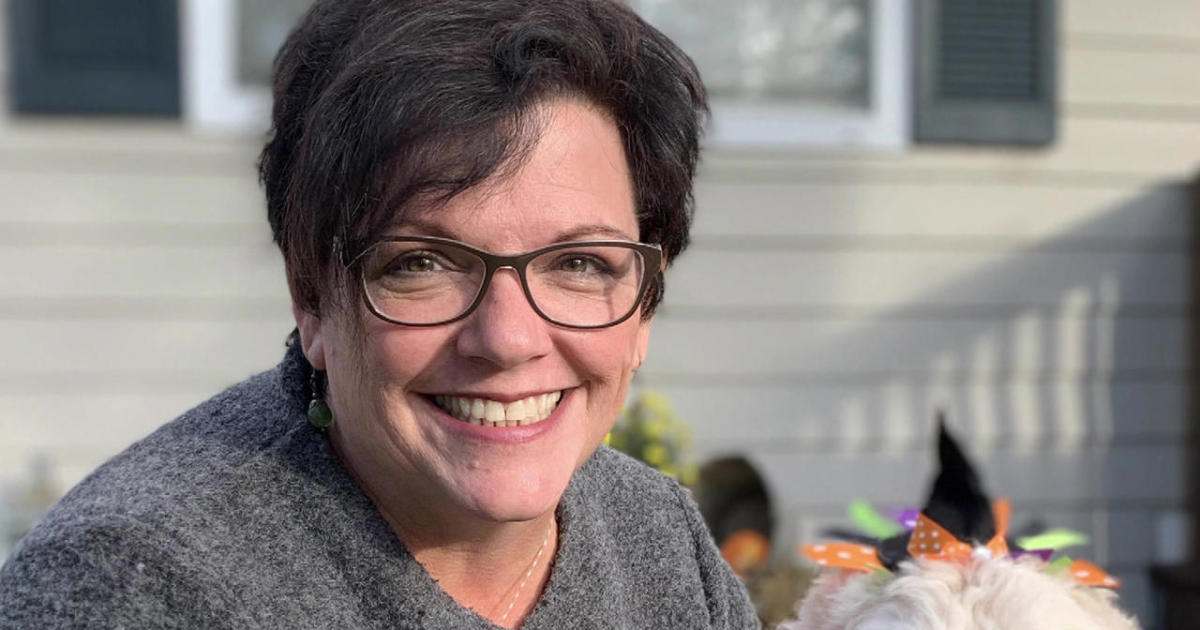Miss USA Asya Branch is helping inmates and their families — one letter at a time
In November, Asya Branch's dreams came true. The Booneville, Mississippi-native took home the title of Miss USA. Now, crown in hand, Branch is trying to fulfill a much bigger dream of hers: establishing her outreach program Love Letters in as many correctional facilities as possible.
When she was 10, Branch's father was sent to prison for conspiracy to commit robbery and kidnapping, a sentence that changed her life forever. After realizing how important letters from her father were, she set out to establish a letter-writing program for inmates and their families. Love Letters donates stationery and stamps to inmates so they can continue conversations and relationships with their loved ones outside the prison walls.
Branch spoke to CBS News about her personal experience with incarceration, the difficulties of Christmas, and the positive impact letters can make in inmates' lives.
This interview has been edited for clarity.
CBS News: The last time we spoke, you said your father's incarceration changed the directory of your life. Did you write to him while he was incarcerated?
Asya Branch: I remember the week he got arrested, I didn't know what to do. I had no way of contacting him and I was lost and confused because when I left for school that morning, I didn't know that would be the last time that I would see him for up to three years. I might have hugged him a bit tighter and told him I loved him. That night when we got home, he was gone and our home was being ransacked by the police. I thought, what do I do?
I pulled out my notebook and I started writing him a letter and I just included some of my favorite Bible verses that he had taught me. I put the Lord's Prayer in there and I sprayed some of my perfume on it — all I knew to do was to write to him.
I mailed him a letter within that first week and we just kept the letter-writing going throughout the entire 10 years. I kept every single letter that he sent me throughout his imprisonment. If I was having a bad day or something, I would pull out an old letter and just read it and I'm still hopeful and a little bit joyful again.
What were some of the things that you guys would talk about in your letters?
Literally everything under the sun. I would write to him if I was having any issues in school and he continued to be that backbone for me and that guidance? We talked about my grades. We talked about me being on the dance team and running track — it was as if he was actually there with me.
I mean, literally, anything that we would have talked about face to face, we talked about in our letters. He just always made sure to tell me how proud he was of me and he just always wanted to be informed of my life.
Christmas season is here, which can be especially difficult for inmates and their families. Was there any holiday that was especially hard for you all?
I don't know if a birthday counts as a holiday but our birthdays and Christmas were just (Asya pauses to collect herself.) You get so used to having both of your parents there and just being able to enjoy family for holidays. My parents' birthdays are also around Christmas. That was extremely difficult as well. It's just difficult because as you get around the holidays and… oh, my goodness, I'm getting all choked up. (She pauses again.)
It is a difficult time because that's when most people spend with their families. My father was always the one to get our Christmas gifts and everything. (Asya begins to cry.)
Him not being there was really hurtful and then knowing my mom was struggling just to simply provide us with the smallest bit of Christmas, making sure we had the bare minimum, but still trying to give some surprises and something to look forward to. Christmas is definitely hard.
But I do remember one birthday where my dad had another family member give me a gift from him — it was an envelope with a heart. On the flip side, it had a cute little saying and it said, "Love, Dad." It was the most touching gift I ever received.
Your story obviously shaped the kind of outreach that you do specifically with Love Letters. Why did you first start the program?
I was really looking for a way to help inmates because I know how difficult it is to be away from your family and to not be able to provide for them. I could hear the hurt in my dad's voice when I would speak to him because he knew he wasn't able to be there to provide for us. He wasn't able to hold our hands and hug us through the hardships that we faced. I was fortunate enough to get that through letters. He was able to write to me and uplift me through the words on our pieces of paper.
I was speaking to a group of women inmates, sharing how important it was to me to get these letters from my dad and how much it meant for me to be able to have something tangible to hold dear to my heart through tough times. One spoke up and said, "I don't have the money on my books to order stationery and stamps, to write my children, and the people that would put the money on my books are at home taking care of my children and spending their last dime on them." She didn't have a way to write to her children if she wanted to.
That's when I realized we can donate the stationery and stamps — that's something easy to provide that makes a massive difference. Within that first year at Lee County Jail, over 300 letters went out—that was just so heartwarming to me because I've heard stories of how it's mended relationships with families.
Have you been able to partner with other companies or programs that will help with the stationary donation?
We partnered with an organization called Day One, an organization that helps rehabilitate inmates once they are released, helping them find jobs, transportation and things of that nature. I have spoken with the communications director of the Mississippi Department of Corrections about implementing Love Letters in jails and prisons throughout the state. We're working on expanding it because I think it is something that everyone should have access to.
Do you have a set of tips for helping kids whose parents are behind bars? What was most helpful to you?
A lot of the time, you can feel like an outcast. A lot of kids get left all by themselves or they don't get to have holiday dinners or their family's not together or their moms out working late all the time—there's a number of different circumstances that children face during these times.
Just be inclusive and connect with a child. Whether it's their kids, classmates, or friends, why not invite them over for dinner? Why not do something to make them feel welcome and important and included, as well as working with angel tree programs in your community?
Little things like that really make the biggest difference, as simple as they may seem. It really is impactful.
Who is someone, whether it's an inmate or a child that you met, that's had a profound impact on you?
Every inmate that I have the opportunity to interact with and every child of an incarcerated parent that I've had the opportunity to interact with because it's been a very personal, eye-opening experience. Everyone's situation is different. I think that being able to go into prisons and sit down and hug and speak with the inmates has really been eye-opening for me.
When Love Letters' was first implemented, there was a woman who started writing to her son and they hadn't had a relationship. But she wrote to him and he was writing her back and she was released. Unfortunately, he passed in a car accident. She later went through his things and found a letter he was writing her and it mended their relationship. She said she never would have written him had it not been for the program.
Do you think that your experience with your father helps you be a better advocate for inmates and their children?
Absolutely. I've always said that I never understood why my father was taken away from us and I understand it now. It gave me this perspective and it made me into something that I never thought about before. I didn't realize how many children suffer from having an incarcerated parent or guardian.
How many of them have gone through similar circumstances myself? It just gave me a new perspective on things and allowed me to be an advocate for something that's so often overlooked. No one talks about incarceration. No one talks about the families. And so I truly believe that you had this not happened to my father, I wouldn't want this passion and this purpose in life.
Though I went through those hardships, I wouldn't be who I was today if I hadn't gotten through them. And so definitely going through it myself has given me this perspective and this passion. Otherwise, I don't think this would be where I am.
I know you said that you want to implement Love Letters at the state level. Are there any other states that you want to kind of expand to? What's your end goal with this?
My end goal would be nationwide. I may not be able to donate to every single state myself, but I mean, how many people within that state would be willing to donate? It could be community service hours for high school students — there's many ways that we can make it happen.
But I think that everyone nationwide deserves to have the opportunity to write to their loved ones because some of them may never get to see them again. So often, people are placed in prisons that are hours and hours away from where their families reside. And that's what happened to my family. We didn't get to see my father very often. So I think that letters are the best option for some people. I want everyone to have the opportunity to communicate with their loved ones in some way and have that tangible piece to hold throughout life.





